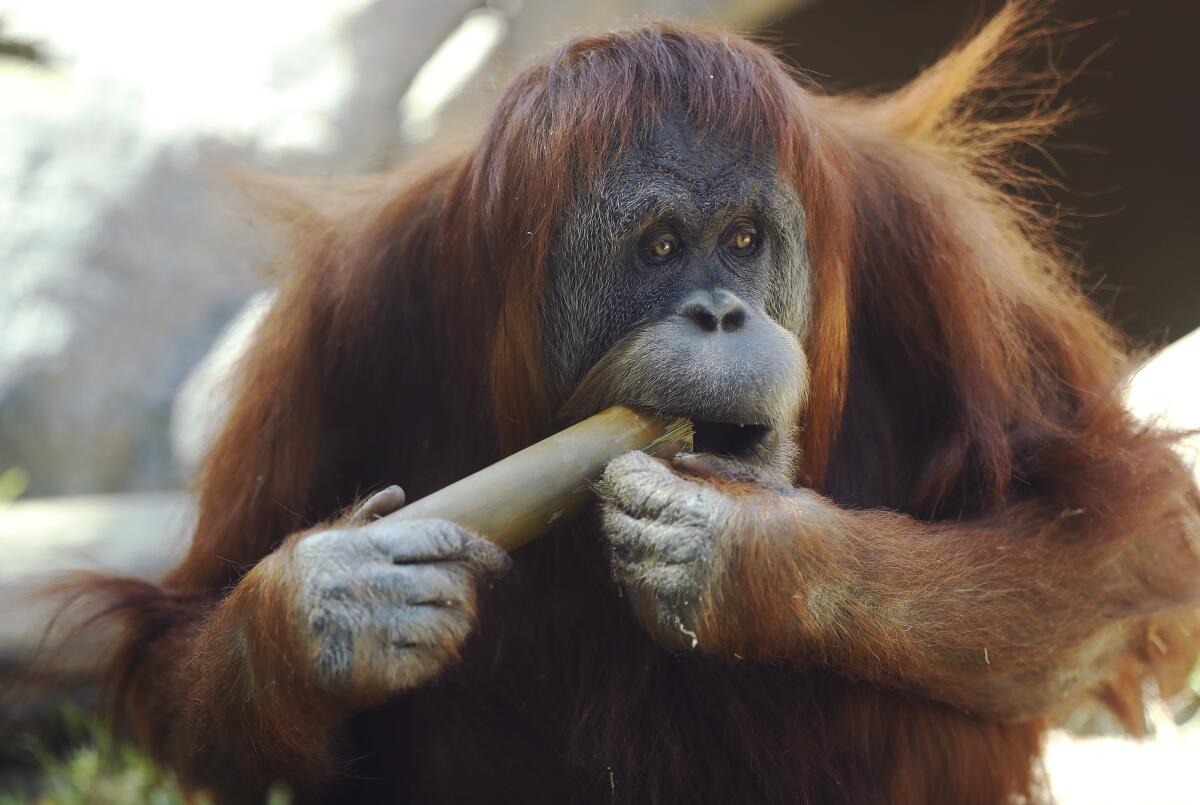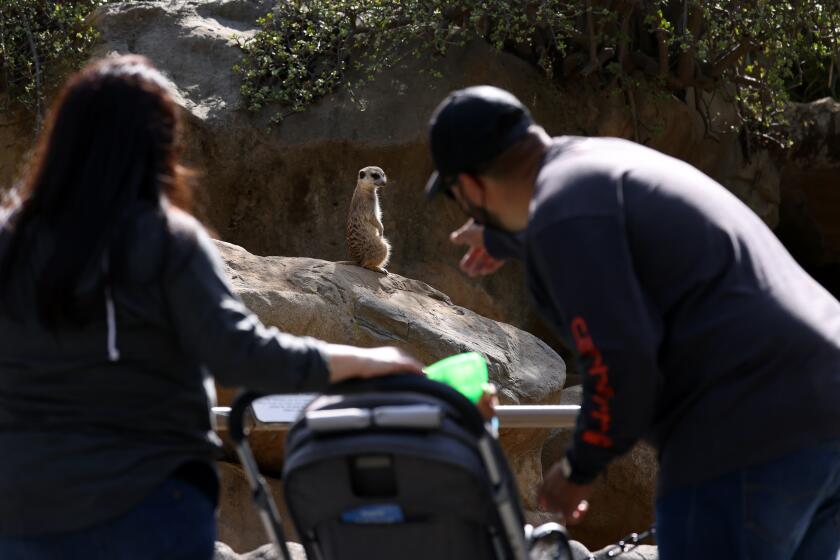San Diego Zoo vaccinates apes against COVID-19

- Share via
SAN DIEGO — Nine great apes at the San Diego Zoo are the first non-human primates to receive an experimental COVID-19 vaccine, zoo officials said Thursday.
Four orangutans and five bonobos have been vaccinated so far, with the zoo planning to immunize three more bonobos and a gorilla soon. These species, along with chimpanzees, are the closest cousins to humans, placing them at risk of contracting a virus that has spread rapidly from person to person.
In mid-January, the zoo’s Safari Park reported that its troop of eight gorillas developed COVID-19 after exposure to a keeper who had the coronavirus, even though the employee had no symptoms and wore protective equipment.
The primates, off public view while they recuperated, are ready for visitors
“That made us realize that our other apes were at risk,” said Nadine Lamberski, chief conservation and wildlife health officer for the San Diego Zoo Wildlife Alliance. “We wanted to do our best to protect them from this virus because we don’t really know how it’s going to impact them.”
Many of the zoo’s veterinarians and other staffers who work with animals have been vaccinated against COVID-19, but Lamberski said that wasn’t the case in January.
At the time, she was already in touch with Zoetis, an animal health company once part of Pfizer. The company is developing a vaccine for animals that delivers a piece of the surface protein the coronavirus uses to grab on to and infect cells. That’s the same approach Novavax is using in a human COVID-19 vaccine that could be cleared for use in the U.S. in the coming months.
Zoetis had been testing its vaccine in minks, cats and dogs, Lamberski said, and it had about 27 doses to spare.
Those doses weren’t authorized for use in people. So the zoo decided to use them on its apes, calculating that the dangers of using a vaccine that hadn’t been tested on primates were outweighed by the risk of the animals contracting COVID-19.
UC San Diego zoologist Pascal Gagneux, an expert on primate evolution, thinks that was the right call.
“It makes quite a bit of sense. These animals are incredibly precious,” he said. “There’s a very finite number of great apes in captivity.”
Gagneux said there are fewer than 200 bonobos in zoos around the world, and the species is more closely related to people than to gorillas, underscoring its potential vulnerability to COVID-19.
The L.A. Zoo reopened on Tuesday. Neither animals nor human onlookers appeared irked by the safety precautions.
Zoo staff inoculated the apes between late January and early February with two doses of the Zoetis vaccine, three weeks apart. These were voluntary injections. In other words, the animals had to willingly sit down, keep still and let a zookeeper prick them with a needle.
No big deal, right?
In fact, the zoo’s apes are used to receiving flu and measles vaccines.
Some of the younger and more energetic apes, however, have been less keen to sit through getting their shots. Lamberski said the zoo staff will try again when the animals are more comfortable rather than risk any complications from anesthetizing them.
She added that most of the animals haven’t had any visible side effects. One or two have rubbed their head or the area around where they got the injection.
It’s hard to know for certain whether those behaviors had any link to the shot, but a bit of soreness and itchiness around an injection site is a common vaccine side effect. So is a headache.
Two of the vaccinated animals — one orangutan and one bonobo — have had blood samples taken since they’ve been inoculated, which will allow scientists to measure their level of antibodies: Y-shaped immune proteins that can latch on to a virus and prevent infection.
“This is a really precious opportunity to observe what happens to endangered great apes when they’re vaccinated to a potentially important disease,” Gagneux said. “Nothing prevents COVID-19 from starting to infect the wild populations.”
More to Read
Sign up for Essential California
The most important California stories and recommendations in your inbox every morning.
You may occasionally receive promotional content from the Los Angeles Times.












